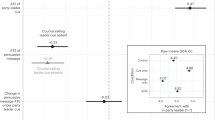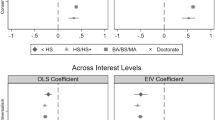This paper examines the persuasability of rhetorical value framing within a presidential nominating campaign, in an effort to understand how values and value-laden language may provide useful signals in electoral contexts where partisan cues are absent. Relying on a survey-experiment conducted during the 2000 Republican nomination campaign, I evaluate the relative persuasiveness of arguments framed in either individualistic or egalitarian terms. Drawing upon an “active-receiver” model of framing effects, I posit that Republican primary voters respond more readily to candidates when they use individualistic frames than when they use egalitarian frames, because individualism is a more “chronically accessible” value construct for Republicans. Furthermore, I hypothesize that this dynamic is particularly pronounced among more educated respondents, who have been trained to recognize abstract value cues and automatically apply them to applied political contexts. The experimental findings support these hypotheses.
Similar content being viewed by others
References
Abramowitz Alan Saunders L. Kyle (1998) ArticleTitleIdeological realignment in the U.S. electorate Journal of Politics 60 IssueID3 634–652
Abramson Paul Aldrich John Paolino Phil David Rohde (1992) ArticleTitle‘Sophisticated Voting’ in the 1988 presidential primaries American Political Science Review 86 55–69
C. Barker David (2002) Rushed to Judgment: Talk Radio, Persuasion, and American Political Behavior Columbia University Press New York
Barker, David C., and Lawrence, Adam B. (2006) (forthcoming). Media favoritism and presidential nominations: reviving the direct effects model. Political Communication
Bartels Larry (1988) The Dynamics of Presidential Primaries Princeton University Press Princeton, NJ
Brambor, Thomas, Clark, William R., and Golder, Matt. (2002). Understanding interaction models: what we thought we knew but obviously didn’t. Unpublished manuscript. Department of Politics, New York University
Brewer R. Paul (2001) ArticleTitleValue words and lizard brains: do citizens deliberate about appeals to their core values? Political Psychology 22 IssueID1 45–64
Chaiken Shelly (1980) ArticleTitleHeuristic versus systematic information processing in the use of source versus message cues in persuasion Journal of Personality and Social Psychology 39 752–766
S. Chaiken A. Liberman A.H. Eagly (1989) Heuristic and systematic information processing within and beyond the persuasion context J.S. Uleman J.A. Bargh (Eds) Unintended Thought Guilford Press New York 212–252
Chong Dennis (1996) Creating common frames of reference on political issues C. Mutz Diana M. Paul Sniderman A. Brody Richard (Eds) Political persuasion and attitude change University of Michigan Press Ann Arbor, MI 195–224
Cobb D. Michael Kuklinski H. James (1997) ArticleTitleChanging minds: political arguments and political persuasion American Journal of Political Science 41 88–121
Delli Carpini X. Michael Keeter Scott (1993) ArticleTitleMeasuring political knowledge: putting first things first American Journal of Political Science 28 95–126
Druckman James (2001) ArticleTitleOn the limits of framing effects: who can frame? Journal of Politics 63 1041–1067 Occurrence Handle10.1111/0022-3816.00100
R. Fazio (1986) How do attitudes guide behavior? R. Sorrentino E. Higgins (Eds) Handbook of motivation and cognition: foundations of social behavior Guilford Press New York
Feldman Stanley (1988) ArticleTitleStructure and consistency in public opinion: the role of core beliefs and values American Journal of Political Science 32 416–440
Feldman, Stanley. (2003). Values, ideology, and the structure of political attitudes. In: Sears, David O., Huddy Leonie, and Jervis Robert (eds.), Oxford Handbook of Political Psychology. Oxford: Oxford University Press.
S Feldman Marco R. Steenbergen (2001) ArticleTitleThe humanitarian foundation of public support for social welfare American Journal of Political Science 45 658–677
Steven Finkel (1993) ArticleTitleReexamining the minimal effects model in recent presidential campaigns Journal of Politics 55 1–21
Andrew Gelman Gary King (1993) ArticleTitleWhy are American presidential election campaign polls so variable when votes are so predictable? British Journal of Political Science 23 409–51 Occurrence Handle10.1017/S0007123400006682
Brad T. Gomez J. Matthew Wilson (2001) ArticleTitlePolitical sophistication and economic voting in the American electorate: a theory of heterogeneous attribution American Journal of Political Science. 45 899–914
Paul Goren (2000) ArticleTitlePolitical expertise and principled political thought Political Research Quarterly 53 117–136
Jennifer Hochschild (1981) What’s Fair? American Beliefs about Distributive Justice Harvard University Press Cambridge
Thomas M Holbrook (1996) Do Campaigns Matter? Sage Thousand Oaks, CA
Jon Hurwitz Mark Peffley (1987) ArticleTitleHow are foreign policy attitudes structured?: a hierarchical model American Political Science Review 81 1099–1120
Shanto Iyengar (1991) Is anyone responsible? University of Chicago Press Chicago
Shanto Iyengar Donald R. Kinder (1987) News that Matters University of Chicago Press Chicago, IL
Jaccard, James, Turrisi, Robert, and Wan, Choi K. (1990). Interaction Effects in Multiple Regression (Quantitative Applications in the Social Sciences #72). Newbury Park: Sage.
William G. Jacoby (2000) ArticleTitleIssue framing and public opinion on government spending American Journal of Political Science 44 750–67
I. Katz R. G. Hass (1988) ArticleTitleRacial ambivalence and American value conflict: correlational and priming studies of dual cognitive structures Journal of Personality and Social Psychology 55 892–905 Occurrence Handle10.1037/0022-3514.55.6.893
F. N. Kerlinger (1984) Liberalism and conservatism: The nature and structure of social attitudes Erlbaum Hillsdale, NJ
C. Kluckhohn (1951) Values and value–orientations in the theory of action T. Parsons E. Shils (Eds) Toward a general theory of action Harvard University Press Cambridge, MA
Jon A. Krosnick Donald R. Kinder (1990) ArticleTitleAltering the foundations of support for the president through priming American Political Science Review 84 497–512
George Lakoff (2002) Moral politics University of Chicago Press Chicago, IL
Richard R. Lau (1989) ArticleTitleConstruct accessibility and electoral choice Political Behavior 11 5–32 Occurrence Handle10.1007/BF00993365
Richard R. Lau Lee Sigelman Caroline Heldman Paul Babbitt (1999) ArticleTitleThe effects of negative political advertisements: a meta–analytic assessment American Political Science Review 93 851–875
Geoffrey Layman (2001) The Great Divide: Religious and Cultural Conflict in American Party Politics Columbia University Press New York
J. Long Scott (1997) Regression Models for Categorical and Limited Dependent Variables Sage Publications Thousand Oaks, CA
Robert Luskin (1987) ArticleTitleMeasuring political sophistication American Journal of Political Science 31 856–899
H. McClosky J. Zaller (1984) The American Ethos: Public Attitudes toward Capitalism and Democracy Harvard University Press Cambridge, MA
Joanne M. Miller Jon A. Krosnick (1996) News media impact on the ingredients of presidential evaluations: a program of research on the priming hypothesis Mutz Diana Paul M. Sniderman Richard A. Brody (Eds) Political persuasion and attitude change University of Michigan Press Ann Arbor, MI
Diana C. Mutz Paul M. Sniderman Richard A. Brody (Eds) (1996) Political Persuasion and Attitude Change University of Michigan Press Ann Arbor, MI
Thomas E. Nelson Rosalee A. Clawson Zoe M. Oxley (1997) ArticleTitleMedia framing of a civil liberties conflict and its effect on tolerance American Political Science Review 91 567–584
Helmut Norpoth Miltion Lodge (1985) ArticleTitleThe difference between attitudes and nonattitudes in the mass public: just measurements? American Journal of Political Science 29 291–307
Philip Paolino Daron R. Shaw (2001) ArticleTitleLifting the hood on the straight-talk express: examining the McCain phenomenon American Politics Research 29 483–506
Samuel L. Popkin (1991) The Reasoning Voter University of Chicago Press Chicago, IL
K.A. Rasinski (1987) ArticleTitleWhat’s fair is fair—or is it? Value differences underlying public views about social justice Journal of Personality and Social Psychology 53 201–11 Occurrence Handle10.1037/0022-3514.53.1.201
Milton. Rokeach (1973) The Nature of Human Values Free Press New York
David O. Sears (1986) ArticleTitleCollege sophomores in the laboratory: influences of a narrow data base on social psychology’s view of human nature Journal of Personality and Social Psychology 51 515–530 Occurrence Handle10.1037/0022-3514.51.3.515
Daron Shaw (1999) ArticleTitleA study of presidential campaign event effects from 1952 to 1992 Journal of Politics 61 387–423
Paul M. Sniderman (1993) The new look in public opinion research Finifter Ada (Eds) Political Science: The State of The Discipline II American Political Science Association Washington, D.C
Paul M. Sniderman Richard A. Brody Paul E. Tetlock (1991) Reasoning and choice: explorations in political psychology Cambridge University Press Cambridge, UK
Walter Stone Ronald Rapoport (1994) ArticleTitleCandidate perception among nomination activists: A new look at the moderation hypothesis Journal of Politics 56 1034–52
Walter Stone Ronald Rapoport Lonna. Atkeson (1995) ArticleTitleA simulation model of presidential nomination choice American Journal of Political Science 39 135–61
Philip E. Tetlock (1986) ArticleTitleA value pluralism model of ideological reasoning Journal of Personality and Social Psychology 50 819–827 Occurrence Handle10.1037/0022-3514.50.4.819
Sidney Verba Gary R. Orren (1985) Equality in America: The View from the Top Harvard University Press Cambridge, MA
John Zaller (1992) The Nature and Origin of Mass Opinion Cambridge University Press Cambridge, UK
John Zaller (1996) The myth of massive media impact revived: new support for a discredited idea Mutz DianaC. M. Paul Sniderman Richard A. Brody (Eds) Political Persuasion and attitude Change University of Michigan Press Ann Arbor, MI
John Zaller Stanley Feldman (1992) ArticleTitleA simple theory of the survey response: answering questions or revealing preferences American Journal of Political Science 36 579–616
Author information
Authors and Affiliations
Corresponding author
Rights and permissions
About this article
Cite this article
Barker, D.C. Values, Frames, and Persuasion in Presidential Nomination Campaigns. Polit Behav 27, 375–394 (2005). https://doi.org/10.1007/s11109-005-8145-4
Issue Date:
DOI: https://doi.org/10.1007/s11109-005-8145-4




